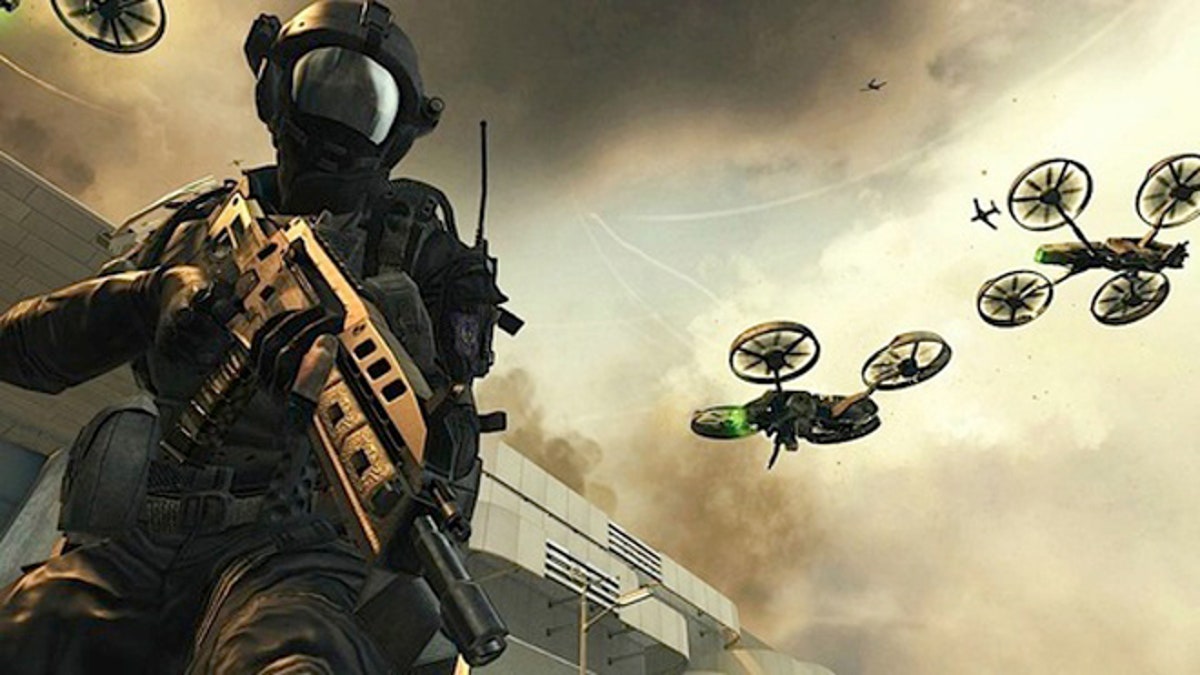
"Black Ops II" cracks the code of producing great 3D effects without messing with game play. (Activision)
"Call of Duty: Black Ops 2" may achieve more than just becoming one of the biggest entertainment products of the year. The best-selling video game could help shape the real-world thinking of the U.S. military through its science fiction story of a Cold War playing out between the U.S. and China in 2025.
The game, whose sales reached $500 million in the first 24 hours, owes plenty of its inspiration to real military weapons and prototype technologies — lumbering battlefield robots, microwave weapons, swarms of flying drones — as well as to today's news headlines regarding cybersecurity threats and the rise of China. But a defense expert who helped create the story for "Call of Duty: Black Ops 2" also points out how his game-consulting work has influenced his day-job thinking about geopolitical issues and technologies that someday could have an impact on the U.S. military.
"It's a weird way to say this, but the experience of working on the fictional game was definitely an aid to my non-fictional work," said Peter Singer, director of the 21st Century Defense Initiative at the Brookings Institution.
When games shape reality
[pullquote]
- Toshiba shows four-legged robot to help in radiated areas with Fukushima nuclear disaster
- Google may avoid FTC anti-trust investigation, report suggests
- Game over: 10 renditions of our post-apocalyptic world
- Videos Games Turned into Real Life
- One mile beneath the earth, dark matter detector nears activation in gold mine
The near-future realism of "Call of Duty: Black Ops 2" also can serve as a guide for real-world technologies, Singer said. He pointed out that one of the game's first marketing videos featured a flying quadrotor drone armed with a machine gun, and that the U.S. military took notice of it long before the game hit store shelves.
But the game's impact won't stop at the higher levels of military planning and think tank analysts. Like any good science fiction story, it also could have a huge influence on what ordinary U.S. soldiers and Marines expect to have in their hands on future battlefields — especially because so many younger troops play video games and enjoy military-themed shooters such as the "Call of Duty" series. [The Big Guns: 'Halo 4' vs. 'Call of Duty: Black Ops II']
"It serves as an inspiration for the real world and also sets the expectations for the future," Singer told TechNewsDaily.
The chance to shape the direction of the best-selling "Call of Duty" series proved irresistible to Singer. He helped the "Black Ops 2" team at Treyarch and Activision by organizing the game's possible military technologies into three categories: active battlefield technologies, prototype technologies that have not yet been battlefield-tested, and technologies that exist only as ideas in research labs.
Serious war games
Singer also brainstormed elements of the game's story involving rising political and military tensions between U.S. and Chinese coalitions. He joked that he and the game's developers were a year ahead of the official U.S. policy pivot toward Asia and China, so that he was already well-equipped to think about those issues.
In that sense, the consulting work on "Call of Duty: Black Ops 2" shared some eerie resemblances with the serious war-gaming exercises conducted by the U.S. military and government officials. Singer himself is currently leading the U.S. military's NeXTech workshop series, organized by the Noetic Group, focused on game-changing battlefield technologies of the future.
"Treyarch was asking about future causes of conflict, geopolitical issues in 2025, and what weapon systems are game-changers," Singer said. "Those are questions necessary for the fictional world, but they're also interesting questions on the non-fiction side."
In terms of influence, "Call of Duty: Black Ops 2" will have a huge advantage over the military and defense think tanks, because as video game entertainment it reaches far more people than any workshop, report or book ever will.
"As popular as my books have been, the numbers are nowhere near the numbers on this video game," Singer said.
- 10 Sci-Fi Predictions That Came True
- Black Friday's Best Gamer Deals Revealed
- 6 Black Friday Myths Busted!
Copyright 2012 TechNewsDaily, a TechMediaNetwork company. All rights reserved. This material may not be published, broadcast, rewritten or redistributed.








































